Як підвищити кваліфікацію
у центрі прогресивної освіти "Генезум"?

-
 збірник матеріалів
збірник матеріалів
-
 публікація на сайті genezum.org безкоштовна
публікація на сайті genezum.org безкоштовна
-
 заочна участь
заочна участь
-
 для закладів загальної середньої освіти
для закладів загальної середньої освіти
-
 для закладів дошкільної освіти
для закладів дошкільної освіти
-
 Сертифікат - 5 год, 0.05/0.1 ЄКТС
Сертифікат - 5 год, 0.05/0.1 ЄКТС

-
 постійний доступ
постійний доступ
-
 можна проходити у будь-який час
можна проходити у будь-який час
-
 дистанційне навчання
дистанційне навчання
-
 для закладів загальної середньої освіти
для закладів загальної середньої освіти
-
 для закладів дошкільної освіти
для закладів дошкільної освіти
-
 Сертифікат - 16/30 год, 0.5/1 ЄКТС
Сертифікат - 16/30 год, 0.5/1 ЄКТС

-
 безкоштовний перегляд
безкоштовний перегляд
-
 інтерактив зі спікером
інтерактив зі спікером
-
 онлайн формат
онлайн формат
-
 для закладів загальної середньої освіти
для закладів загальної середньої освіти
-
 для закладів дошкільної освіти
для закладів дошкільної освіти
-
 Сертифікат - 2 год, 0.06 ЄКТС
Сертифікат - 2 год, 0.06 ЄКТС

The theme: My ID.
The purpose of the lesson:
To practice:
- talk about different countries and nationalities,
- ask for and give basic personal information using to be,
- understand simple text giving basic personal information,
- write a short personal profile
Summary of the lesson
І. Actualization of basic knowledge
- Dictionary work:
- put words together:
American, Australian, Brazilian, Australia, Brazil, China, Egypt, Mexico, Russia, Spain, the UK, the US, Turkey, Ukraine, British, Chinese, Egyptian, Mexican, Russian, Spanish, Turkish, Ukrainian.
For example: Australia - Australian
- correct the mistakes:
Tom am from the UK.
I are Spanish.
My friends, Nick and Polly, is from Egyptian. They are Egypt.
- answer the questions:
- What is your name?
- How do you spell your name?
- How old are you?
- Where are you from?
- What nationality are you?
- What do you do?
- Do you like to go to school?
- How many lessons do you have a day?
- What is your favorite subject?
- What are you good at?
- What do you think about your life today?
- Play the game “Hi, my name is…” Each pupil has a picture of different countries’ flags. He or she has to tell about himself or herself according to the picture.
For example: Hi, my name is John. I am from the US. I am American. Washington is the capital of the US.
ІІ. The main part of the lesson
- Listening three texts and look for the photoes of famous people (Oscar, Bruno Mars, Liam Hemsworth) and answer the question: Who are they? After it complete the sentences:
- I’m Tom. I’m 12 and I’m British. I live in London. My hobby is football. London is very important city for football. I think five or six London clubs are in the Premier League now. One of them is Chelsea. I am a big Chelsea fan. My favourite football player is Oscar. He isn’t British, he is Brazilian.
- My name is Olena. My best friend is Irina. We’re 13 years old. We’re from Poltava in Ukraine. We are in a choir. Our favourite songs in choir are pop songs. Irina and I are big fans of British and American pop music. My favourite singer is Bruno Mars. That’s why my dog’s name is Bruno. My cat is called Vanilla because it’s the colour of vanilla ice-cream, my favourite type of ice cream.
- My name is Murat and I’m from Izmir, a big city in Turkey. I’m really interested in making films. I go to a film club every Saturday. My favourite types of films are superhero or action films. My favourite actors are Liam and Chris Hemsworth. They’re brothers. They aren’t American. They are from Australia. Liam Hemsworth is in The Hunger Games and Chris is in Thor. Chris is about 32 and Liam is 26.
- Tom's hobby is ______ .
- Tom is a big Chelsea ____ .
- Tom's from _______ .
- Elena has got ________, Irina.
- Elena's favourite singer is _______ .
- Elena's ______ is called Vanilla, because her favourite type of _______ .
- Murat is _______ .
- He is interested in _________ _________ .
- Liam and Chris Hemsworth are _________ favourite actors.
Practise exercises:
- Look at the sentences and complete the verb table:
- I’m Tom.
- He isn’t British.
- He’s Brazilian.
- They aren’t American.
- They’re from Australia.
- We’re 13 years old.
|
Affirmative |
|
I ……….. British. |
|
You’…. British. |
|
He/She/It’ … British. |
|
We ………. British. |
|
They …….. British. |
|
Negative |
|
I …… not Brazilian. |
|
You ……. Brazilian. |
|
He/She/It……… Brazilian. |
|
We ………. Brazilian. |
|
They ………. Brazilian. |
- Match the long forms and their contractions.
Long forms: 1. are, 2. are not, 3. is, 4. am, 5. am not, 6. is not
Short forms: a) ‘m, b) ‘re, c) ‘s, d) ‘m not, e) aren’t, f) isn’t
- Write sentences using the words and nationalities:

Now make the sentences in ex. 3 negative.
Example: I’m not British.
- Choose the correct alternative.
1). Katy Perry isn’t/aren’t Australian.
2). Katy Perry and Bruno Mars is/are from the US.
3). You and I am/are British.
4). My best friend is/are Jack.
5). Chelsea and Arsenal isn’t/aren’t Spanish teams.
6). They is/are 14 years old.
- Complete the sentences with the correct form of the verb to be in the affirmative or negative.
SCOTT, 13,LOS ANGELES, THE US.
My nane (a)_____ Scott. I (b) _____ 14 yet. I (c) ______ only 13. My best friends (d) _____ Jim and Neil. Jim, Neil and I (e) _______ from the US but we (f) ______ from New York. We (g) ______ from Los Angeles. Los Angeles (h) _______ really big. I love it – I (i) _____ very happy here.
- Work with a partner. Use the words to write six grammatically correct sentences.
|
is |
I |
am |
|
the UK |
not |
are |
|
Marisa |
We |
Brazilian |
|
from |
aren’t |
isn’t |
Example: I am from the UK.
- Put the words in order to make questions.
1). Spain Are from you.
2). American Is Ed Sheeran.
3). Are friends we.
4). Europe Is in Turkey.
5). British Are your parents.
- Lesson result.
- work in the groups:
Group 1.
You have got maps, the names of the capital cities. Pick an imagine of a flag and a name of the country.
Group 2.
You have got the names of the countries and the images of their flags. Pick the images of their maps and their nationalities.
Group 3.
You have got the parts of the maps and the pictures of some flags. Pick the names of the countries and their capital cities.
- check the results of the groups’ action.
The lesson is over.
The theme: My ID.
The purpose of the lesson:
To practice:
- talk about different countries and nationalities,
- ask for and give basic personal information using to be and have got,
- talk about their families,
- understand simple text giving basic personal information,
- write a short personal profile
Summary of the lesson
- Actualization of basic knowledge
- Dictionary work: read and translate, then complete the text with these words. Check that you understand all the words in red.
aunt, brother, cousins, father, grandfather, grandparents, mother, nephew, uncle
My family
I’ve got one ____________ . His name is Liam. He’s good to me, because I’m his little sister. My _______ is called Sandra and my ______ is called Jack. My parents are the best. Harry and Amy are my ___________. I love them. My grandmother is really special and her husband, my ________, is great. Henry is my ____________ . His wife, my _______, is called Anne. Henry and Anne are really good to me and Liam because I’m their only niece and Liam is their only _______ . They have got two children. They’re my ________ and they’re called Oliver and Sophie.
- Work with a partner: write down the names of six people in your family. After it look at your partner’s names and guess who the people are.
Is Lisa your mother? No, she isn’t.
Is she your aunt? Yes, she is.
- The main part of the lesson
- Read the information about the UK.
- The average number of people living in a UK home is 2.4 people.
- 943,000 people are from Czech Republic, Estonia, Poland, Hungary, Latvia, Lithuania, Slovakia and Slovenia.
- There are 3.5 million children under 5 in
- 6 million: male population.
- 5 million: female population.
- 1 in 6 people in the UK is over 65.
- The average age of the population is 39.
- Ethnic population is 12% of the UK population (=7.5 million).
- Look again at this information. Are these sentences True (T) or False (F)?
- There are over 28 million men and boys in the UK. T/F
- The average age in the UK is just under 40. T/F
- 7/5 million is 12% of the total UK population. T/F
- The average number of people living in a house or flat in the UK is under two. T/F
- Under 20% of the UK population is over 65. T/F
- There are three and half million children under five in the UK. T/F
- The male and female population is over 55 million. T/F
- 943,000 people in the UK are from four countries in Eastern Europe. T/F
Grammar in context. Have got.
- Look at the sentences and complete the verb table:
- Sarah’s got a dog.
- Have you got a dog?
- No, I haven’t.
- She hasn’t got a DVD.
|
Affirmative |
|
I/You/We/They’vegot three cousins. |
|
He/She/It __________ brown eyes. |
|
Negative |
|
I/We/You/They haven’t got three cousins. |
|
He/She/It _____________ brown eyes. |
|
Question form |
|
_______ I/you/we/they ______ three cousins? |
|
Has he/she/it got brown eyes? |
|
Short answers |
|
Yes, I/you/we/they have. No, I/you/we/they ____________ . |
|
Yes, he/she/it has. No, he/she/it hasn’t. |
- Match the contractions and the long forms.
Contractions: a) ‘s got b) ‘ve got, c) hasn’t got d) haven’t got
Long forms: 1) has not got, 2) has got, 3) have not got, 4) have got
- Look at the table. Write complete sentences with the correct affirmative or negative form of have got
|
|
|
|
|
|
Zoe |
V |
X |
X |
|
Alex |
X |
V |
V |
|
Lucy |
X |
X |
V |
- Zoe/ a cat - Zoe’s got a cat.
- Lucy/ a bike - ___________________ .
- Alex and Lucy/ mobile phones - _______________ .
- Alex and Lucy/cats - ___________________ .
- Alex /a bike - _________________ .
- Zoe/a mobile phone - _________________ .
- Put the words in order to make questions.
- got a or sister Have you brother?
- Has family got your car a?
- pet a you Have got?
- grandfather phone a mobile your Has got?
- an dictionary you Have English got?
- Work with a partner. Ask and answer the questions.
- Complete the text using the correct forms of to be and to have
Nicole Kidman _______ a famous actress. She _______ a famous husband. Her husband ________ a singer called Keith Urban. They _____ two children. Their names _____ Sunday Rose and Faith Margaret. Nicole ______ a brother, but she _______ a sister called Antonia. Nicole and Keith _______ houses in Sydney, Los Angeles and Nashville.
- Read the Fact File. Write Jordan’s message for the website
|
FACT FILE |
|
Name: Jordan Surname: Clark From: Manchester, the UK Age: 14 Family: parents: Andrew and Helen - brothers and sisters: one brother – Jake (16), one sister – Becca (8) Pets: a cat – Tucker Hobbies: music and films |
|
Hi, my name’s …. |
- Find and correct a mistake in each sentences:
- Your classroom got a window?
- Yes, it have.
- Have you a desk?
- Yes, I has got a big desk.
- Have got your friends mobiles?
- No, they hasn’t.
The lesson is over.
The theme: School days.
The purpose of the lesson:
To practice:
- talk about a basic school days,
- use question words to ask basic questions,
- understand simple text about school life,
- give basic physical descriptions,
- write a short informal email
Summary of the lesson
- Actualization of basic knowledge
- look at the picture and make up sentences as more as possible.
For example: It is a big modern classroom. There is a blackboard in the classroom.
- The main part of the lesson.
- read the words. Do you understand the meaning of these words?
art, English, French, geography, history, ICT (Information and Communication Technology), maths, music, PE (physical Education), science/
- work with a partner. What subjects have you got today?
We’ve got Maths at quarter to nine. Then we have got English.
- look at the picture and read the words. Match the pictures with the words.
|
Calculator, folder, laptop, marker pens, mobile phone, MP3 player, pencil case, snack, tablet, trainers. |
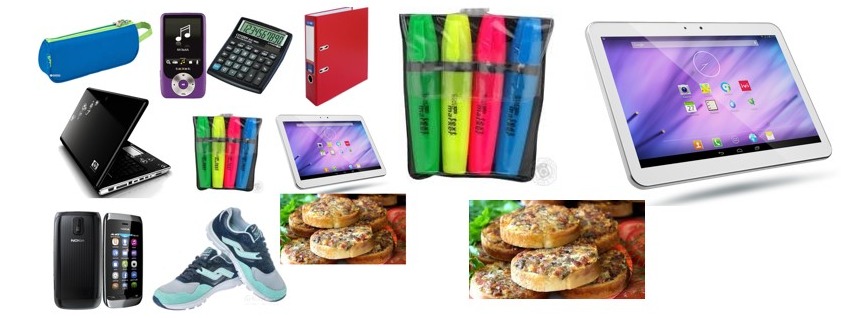
- Work with a partner. Say which of the objects in the pictures you have got now and why.
I’ve got my trainers. Why? I’ve got football practice after school.
READING:
Bring your own technology (BYOT) to school.
The idea is simple. In some schools, students take their personal smart phone, tablet or laptop to school and use it in class. But is that a good idea? What’s your opinion?
Mia Jones, student.
- In some schools they have a BYOT system? But not in mine. In my best friend’s school, students take their smart phones to use in class. But then they send texts, play games, watch videos or take photos. That’s OK at home, but not at school.
Brad Simmons, teacher
- New technology is expensive for schools. But my students all have smart phones at home. Now I bring mine to class and they bring theirs. It’s very useful in many different school subjects. A smart phone has a calculator for maths, a dictionary for English or French, maps for geography, and videos for history, science…
Angela Hughes, parent
- I’ve got two daughters. At my daughters’ school, they have a BYOT system. But the children aren’t happy. Now there’s a big difference between students in class. Some students have got brilliant new laptops of tablets. Some have got old laptops. And for some it isn’t easy to buy a computer. I don’t think it’s fair.
What is BYOT to school?
Who thinks BYOT to school is good?
- Mia Jones – Yes/No
- Brad Simmons – Yes/No
- Angela Hughes – Yes/No
- Are the statements True (T) or False (F)?
- It’s necessary for Mia to take her phone to class. T/F
- In Mia’s opinion, students learn a lot with phones in T/F
- In Brad’s opinion, it’s difficult for schools to buy laptops and tablets. T/F
- In Brad’s opinion, smart phones are only useful for science. T/F
- In Angela’s daughters’ school, the BYOT system is not popular with the students. T/F
- In Angela’s daughters’ classes, the students have all got similar technology. T/F
Remember!
- In True/False / Not Mentioned exercises, read the statements before you listen. The statements help to give you an idea of what you are listening for.
- Be careful. The words in the statements are not always exactly the same in the listening text. They often express the same idea but in different way.
- In True/False / Not Mentioned exercises, put Not Mentioned if the information is not in the listening text.
SPEAKING
What about you?
- When do you use a mobile phone or smart phone?
- When is it important to switch it off?
LISTENING
At Ashton High School in the UK, students study the usual subjects. They study English, geography, history, maths and science. But Ashton High School is special. The students have all got a tablet.
Some students take their tablets to class. Other students use the school’s tablets. Students use the tablets in class and they take them home.
The lessons at school are all online. Teachers send information to the students’ tablets and students ask questions on theirs. The students use their tablets to look for information on the Internet, to create videos and to take photos of their work.
For the school head teacher, technology is important. The tablets are popular and the students are interested in the lessons. And the exam results at school are good.
Karen Ellis is a student at Ashton High and she says: “My cousins go to different school. We’ve got tablets at our school, but they haven’t got tablets at theirs. Some students at their school take their smart phones or tablets to use in class. But some students haven’t got a smart phone or tablet. There’s a difference between students at their school, but there isn’t a difference at mine”.
Andy Blackwell is Karen’s classmate. “We use the tablets in many different ways. We ask the teacher questions on our tablets and he answers our questions on his. We’ve got the information on our tablets to use at home. It’s brilliant!” he says.
- Match the halves to make sentences:
- Students use tablets in class a) to the students’ tablets.
- Teachers send information b) they take them home.
- Students ask questions on the tablets c) and the teachers answer them.
- Are these sentences True (T) or False (F)?
- The school has got tablets for students. T/F
- Students take the tablets home. T/F
- Students play games and send text in lessons. T/F
- In Karen’s opinion, the students at her school are unequal. T/F
- In Andy’s opinion, it’s useful to ask questions on the tablet. T/F
III. The end of the lesson
- Which of these statements are good (G) or bad (B) opinions about tablets?
- Students are interested in the lessons. G/B
- Some students aren’t into technology. G/B
- It isn’t necessary to take books to school. G/B
- Students have information about the lessons on their tablets.
- Tablets are expensive for schools.
The theme: School days.
The purpose of the lesson:
To practice:
- talk about a basic school days,
- use question words to ask basic questions,
- understand simple text about school life,
- give basic physical descriptions,
- write a short informal email
Summary of the lesson
- Actualization of basic knowledge
- Put the letters in order to make school subjects:
- rta __________,
- ishEngl __________,
- enFrch _________ ,
- phgraygeo ____________ ,
- tohisry ___________ ,
- TCI ___________ ,
- simuc _________,
- EP ________ ,
- iescnce ________ ,
- smath __________ .
- Complete the sentences about David’s school timetable.
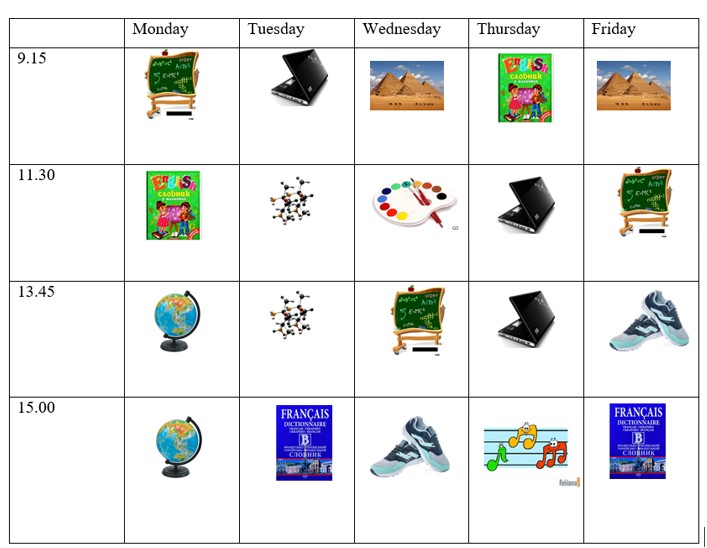
- At quarter past nine on Monday, he’s got ______________ .
- At half past 11 on Tuesday, he’s got ________________ .
- At three o’clock on Wednesday, he’s got _____________ .
- At quarter to two on Thursday, he’s got ___________ .
- At quarter past 9 on Wednesday, he’s got _________ .
- At three o’clock on Tuesday, he’s got _________ .
- At quarter to two on Monday, he’s got __________ .
- At half past 11 on Wednesday, he’s got _______ .
- At quarter past nine on Friday, he’s got ____________ .
- At three o’clock on Thursday, he’s got _____________ .
- The main part of the lesson
- Write the words in the correct category. Use a dictionary if necessary.
|
biology • chemistry • glue• literature• paper• pencil sharpener• physics• scissors• social science• stapler |
|
|
School subjects |
Everyday objects |
|
|
|
|
|
|
|
|
|
|
|
|
|
|
|
- Teacher’s explanation using Possessive‘s
- Look at the sentences (a-c) and then match 1 to 4 with A to D:
a In my best friend’s school, it’s OK to take a phone.
b I’ve got two daughters. At my daughters’ school, it’s OK to take smart phones.
c In Mia and Angela’s opinion, technology isn’t good.
- We use the apostrophe (‘) …
- After singular names or nouns ….
- After plural nouns ending – s…
- When we name more than one person….
A we just add an apostrophe (‘).
B to show possession.
C we add ‘s
D the ‘s goes after the last person.
- Write sentences:
Example: Harry → mobile phone. It’s Harry’s mobile phone.
My dad → bag
The teachers →computer
My sisters → marker pens
Emma → MP3 player
The students → book
Alex and Amy → tablets
Are the sentences correct? Rewrite the incorrect sentences.
- They’ve got tablets at William’s and Dana’s school.
- Is Jack’s pencil case blue?
- My friend’s names are Oscar and Ellie.
- My music teachers’ names are Paula and Eve.
- Our schools head teacher is in favour of mobile phones.
- It’s my grandparents’ house.
- I think they’re Matt and Joe’s bags.
- SPEAKING
Work in a small group. Point an object in the classroom. Whose is it?
Example: It’s Katie calculator.
- Teacher’s explanation using Possessive Pronouns
|
Singlar |
Plural |
|
mine |
ours |
|
yours |
yours |
|
his/hers/its |
theirs |
We use Possessive Pronouns when we don’t repeat the noun.
My name is Robert and hers is Helen.
My school is in the city centre. Where is yours?
Their trainers are new. Mine are really old.
- Look at the sentences a to c and complete 1 to 3 with the correct possessive pronouns.
A It’s OK to take a phone, but she doesn’t take hers.
B In some schools they take smart phones, but not in mine.
C I bring my phone to class and the students bring theirs.
This is my phone. = This phone is (1) _________ .
This is your phone. = This phone is yours.
This is his phone. = This phone is his.
This is her phone. = This phone is (2) __________ .
This is our phone. = This phone is ours.
This is their phone. = This phone is (3) ___________ .
- Choose the correct alternative.
- She’s my/mine best friend.
- Are they your/yours pens?
- The red pencil case is my/mine.
- They’re our/ours bags, not your/yours.
- I think the laptop is their/theirs.
- Whose trainers are they? Are they her/hers.
- I think they’re Matt’s trainers. Yes, they’re his/theirs.
- Answer the questions using possessive pronouns.
- Are they Vanessa’s books? Yes, they’re hers.
- Is it your MP3 player? Yes, _________ .
- Is it Ethan’s dictionary? Yes, __________ .
- Is it your brothers’ tablet? Yes, __________ .
- Are they our pencil cases? Yes, _______ .
- Is it my snack? Yes, ________ .
- Look at the two lists. Read.
List 1: Irregular nouns List 2: Regular nouns
man → men boy → boys
woman → women girl → girls
child → children friend → friends
person → people family → families
country → countries
- What can you see? Write sentences about the pictures using numbers and the singular or plural form of the word.
The Johnson family The Henderson family
I can see….
- two girls. (girl)
- _______________ (family).
- _______________ (boy).
- _______________ (woman).
- _______________ (man).
- _______________ (person).
7.________________ (child).
- Vocabulary
Work with a partner. Say the words in the box and touch the different parts of your face.
|
mouth• ear• eye• hair• nose• teeth |
- Look at the adjectives in the box. What part (s) of the faces can we describe with each adjective? One word cannot describe a part of the face. Which one? Use your dictionary to help you if necessary.
|
big • blue • brown • curly • dark • fair • green • grey • long • red • short • small • straight • tall |
For example: I think curly is for hair.
- Listen the description of the boy in the photo. Find three mistakes.
He has got long fair hair. His hair is curly. He’s got brown eyes.
His eyes are big. His ears and mouth aren’t very big or small –
they’re average.
- Write a description of yourself.
The lesson is over
The theme: School days. Organizing your studies.
The purpose of the lesson:
To practice:
- To think about where and when to study, to see how other students organize their time and space and to create a weekly study plan.
Summary of the lesson
- Actualization of basic knowledge
- Read the information in the box. Match the words with the pictures.
|
school timetable (n): On a school timetable you have all the days and times of your classes. shelf/shelves(n singural/plural): Put the books on the shelf in the correct section. study planner (n): With a study planner, you write all the things you do in a day, at school and after school. time management (n)/ manage your time (phrase): Time management helps your to use your time in good, efficient way. |
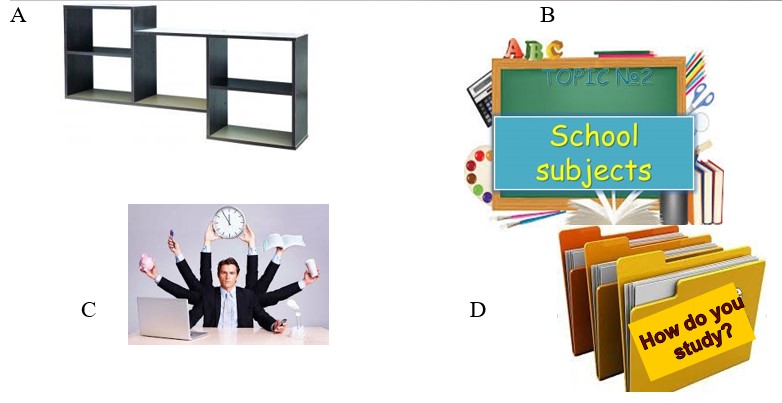
- The main part of the lesson
Vocabulary: read the words in the box and check that you understand theirs.
|
study space • private place • disturb • reading lamp • comfortable chair • logical way • separate sections |
- Read about study spaces and then evaluate your own study space. Is it good or bad? Why?
|
STUDY SPACE – Some tips · It’s useful to have a special place to study. It’s easy to have everything organized and ready there. · If you haven’t got a private place to study, ask your family and friends not to disturb you when you are busy. · It’s ideal to have good light when you read and write. It’s important for your eyes. Light from the window is best in the day. But a reading lamp is important for the evening and night. · Open your window. Fresh air is good too. · A comfortable chair is important. If you aren’t comfortable it’s difficult to concentrate. · It’s important to organize your books in a clear and logical way. Have a special shelf for your school books. · Use different folders for different subjects. Put separate sections in your folders for different topics. Now it’s easy for you to find information quickly. · Have you got a TV/game console/mobile phone/tablet in your room? Turn them off when you study. |
|
YOUR STUDY SPACE |
|
Where do you usually study – in your bedroom, in another room at home, in a library, in a school….? |
|
Have you got a comfortable chair? |
|
Have you got a place where you can write? |
|
Has the place got a lot of life? |
|
Is it quite? |
|
Where are all your books? Is it easy to find the things you need to take to school each day? |
|
Is it easy to find all your notes for different subjects and topics? How are they organized? |
- Work with a partner. Look at the pictures. Using the information in the text “Study space – some tips”, what is good and bad about these study places? Make two lists: Good/Bad.
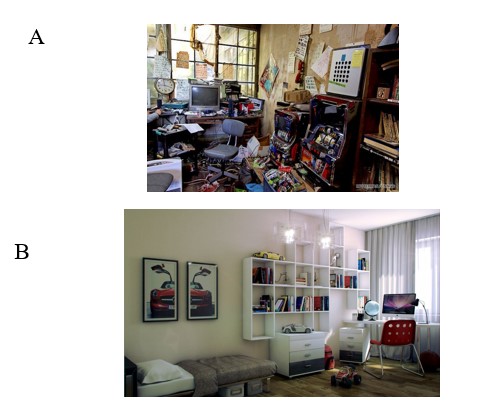
- Grammar in context
- Complete the questions with these question words.
|
How many • How old • What • Where • Who |
- _________ do you study? I study at home.
- ____________ students has your school got? It’s got 420 students.
- ____________ subjects are typical at your school? The usual subjects, but also other subjects.
- __________ is your geography teacher? His name is Mr Bevan.
- __________ are the students at your school? They are between 7 and 18.
- Complete the dialogue with question words and act it.
Tom: (a) _________ are you, Chiara?
Chiara: I’m 13.
Tom: (b) __________ are from?
Chiara: I’m from Brighton, in England.
Tom: (c) _________ ‘s your birthday?
Chiara: It’s in June.
Tom: _________ brothers have you got?
Chiara: I’ve got two brothers.
Tom: _______’s the name of your school?
Chiara: It’s Inter. Net High.
- Find and correct a mistake in each sentence.
- How many homework have you got?
- Hers teachers are very good.
- My pens are blue. This pens are mine.
- The persons at my school are nice.
- The students in Spain haven’t got school on Saturday.
- Look at the photos and read the questions. Write your answers in your notebook.
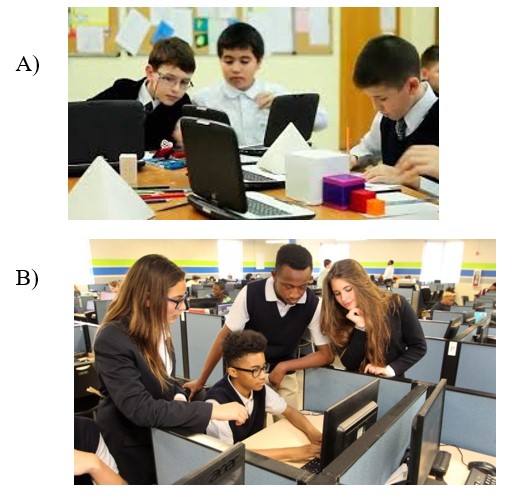
- Who are they?
- Where are they?
- Is your classroom similar or different?
- What are your favourite subjects?
- Use the notes to write an e-mail to Maya:
Charlie Harper
Boston, the US
A brother (James, 16 years old)
Greenhill School (600 students)
Favourite subjects – maths, science
Tuesday – guitar lessons, Saturday – film club
Music – pop (Rihana)
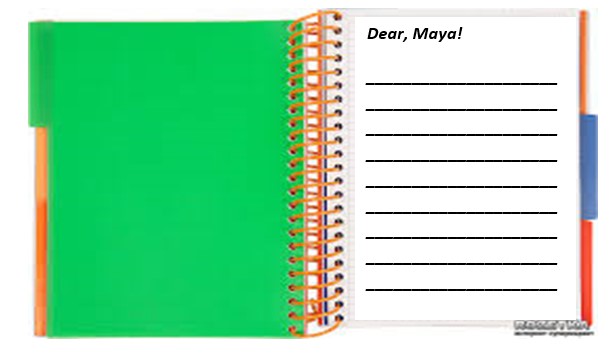
- read your e-mails.
- Read and tell the school subjects:
- I like numbers and I use my calculator.
- I’m interested in different countries. I like maps.
- I love colours and I’ve got a lot of posters at home.
- We use a British dictionary for new words.
- I like animals and plants.
- We learn about life in the past.
- Circle the correct alternative.
- My favourite subject is PE/ICT because I like computers.
- My aunt and uncle have got blue eyes, but their son, my cousin/nephew, has got brown eyes.
- I’ve got two Egypt/Egyptian They are from Cairo.
- Have you got your marker pens/dictionary today? We’ve got Art.
- My grandfather/parent is 60 and he’s got grey hair.
- I’ve got my folder/calculator today because we’ve got maths.
LISTENING
Listen the e-mail letters from James. What are James’s answers to these questions.
Hi, my name’s James Farrell. I’m your new e-pal. I’m from Galway in Ireland. My school is called Manor Park. It isn’t a very big school. It’s only got 400 students. My favourite subjects are maths and science. I’ve got maths on Monday and Wednesday and science on Tuesday and Friday. I also like ICT. At school we’ve got a special computer room. After school we’ve got a lot of homework. But I’ve also got time for other activities. For example, I’m in the school drama club. At the weekend I’ve got guitar lessons.
Write me soon and tell me about yourself. All the best. James.
- What’s the name of your school?
- Is your school big or small?
- How many students has your school got?
- What are your favourite subjects?
- When have you got maths?
- Have you got a computer room at school?
- Have you usually got a lot of homework?
- Have you got special hobbies or activities after school?
The lesson is over.
The theme: School days. Incredible schools.
The purpose of the lesson:
To practice:
- To think about where and when to study, to see how other students organize their time and space and to create a weekly study plan.
Summary of the lesson
- Actualization of basic knowledge
- complete the text with the words in the box
|
homework • school • football club • laboratory • 800 • modern • piano • Tuesday and Thursday • PE and ICT • Art • activities • name’s • quite big |
Hi, James! My ______ Juan Tello. I’m from Murcia in Spain. My _______ is called Antonio de Nebrija School. It’s very ________ and ________ . It’s got ______ students. My favourite subject are art, ________________. I’ve got ______ on Monday and Wednesday and PE and ICT on ______________________ . I also like science. At school we’ve got a really modern __________ . After school we’ve got a lot of _________ . But I’ve also got time for other ________ . For example, I’m in a ____________. At weekends I’ve got _______ lessons.
- complete the five dialogues. Choose the correct responses.
- What are your hobbies?
- a) Yes, they are. b) I’m into sport. c) My cousin is interested in superhero films.
- What’s this in English?
- a) I’m sorry, I don’t know. b) How do you spell that? c) Yes, it’s a notebook.
- Where is Fiona from?
- a) I think this is Irish. b) The US, I think, or maybe Canada.
- c) I don’t know. Maybe she’s from school.
- Is that your tablet?
- a) No, it’s my mum’s. b) My mum’s got a tablet. c) Which tablet is yours?
- What do you think of this album?
- a) I love music, especially pop. b) The singer is great. c) No, I think it’s my brother’s.
READING
read about three schools. Match the schools and photos.
1_____, 2______, 3_______.

INCREDIBLE SCHOOLS!
|
1. There schools are in very cold places. Esperanza Base is an Argentina army base in Antarctica. There are about ten families. The base has got a primary school, and two teachers. Antarctica has got one other primary school. It’s in Villa Las Estrellas, a Chilean army base. Villa Las Estrellas has got approximately 15 students and two teachers. The teachers in the Antarctic are from Argentina and Chile so the classes are in Spanish. |
|
2. Pumaqangtang is a town with about 1 000 people in it. It’s in Tibet, in the Himalayas. It’s got a primary school. The school is very, very high. It’s at an altitude approximately 5,500 metres. The school has got about 105 students. Their home is in the school. One problem there is a temperature. Some days it’s minus 40° C! The school is about 30 years old. The classes are in Chinese and Tibetan. |
|
3. Gulu village is in Chine. The old primary school is in a spectacular place in a National Park. But it’s very difficult to get there, and very dangerous. And it’s a long journey, because it’s a five-hour walk! The school has got five classrooms but just one teacher. They haven’t got computers. There’s a place to play basketball, but it isn’t easy to play basketball high in the mountains. So now the students have got a new school in different place. The school is big and it’s easy to get to class. Their old teacher is with them in the new school. |
- read the texts again. Are these sentences True (T) or False (F)?
- Antarctica has just one primary school. T/F
- The teachers in Antarctica are Spanish. T/F
- The students in Pumaqangtang School are in the school in the day and at night. T/F
- The only unusual thing about the school in Pumaqangtang is that it is very cold.
- The old Gulu village school is very far from the children’s village.
- The students from the old Gulu village school have a new teacher.
LISTENING.
Listen about two schools and answer the questions.
Which school ……
- is in different countries? 2. is in one country?
Global Schools.
Northgate Community College.
Northgate Community College in the UK has got maps of the world on the walls. Why? Because the school has got students from 60 countries. It’s got students from Italy, Japan, Turkey, China and South Africa.
Northgate is a big school in London. It’s got 1,400 students between the ages of 11 and 19. The teachers speak English in class, but the students speak 70 different languages at home. But language isn’t a problem. There are extra lessons in English. The school is also a special sport school. Students play football, basketball and tennis, and language isn’t necessary to do sports.
Think Global School.
Think Global School is the world’s first mobile school. It isn’t in one country, but in many different countries. The students live in 12 countries in four years. In one year, for example, they are in New Zealand for three months, in Costa Rica for three months and another three month in Greece. Typical subjects are maths, ICT, geography and history, and also activities to learn about the local culture.
The school has got 12 teachers and around 50 students. The students are between the ages of 14 and 17 and they are from 23 countries. The lessons are in English, but they have also got Spanish and Chinese lessons. Technology is very important in this school. The students use mobile phones and tablets in their lessons.
- Listen the texts again. Are these sentences True (T) or False (F)?
- The students at Northgate Community College are from the UK. T/F
- The lessons are in English. T/F
- Sports are important at Northgate Community College. T/F
- Students at Think Global School are in 12 countries in one year. T/F
- The school has got students from different countries. T/F
- The lessons are only in Spanish and Chinese. T/F
WRITING
- This is the part of e-mail from an English friend.
My favourite subject is maths and I also like ICT. What subjects do you study at your school? Which are your favourite subjects?
- Write an e-mail to your friend answering his/her questions. correct the mistakes in the sentences:
- I have 13 years.
- My birthday is the five of August.
- I am from Turkish.
- My favourite hobby music.
- I love the sports.
- This is the dictionary of Paul.
- My best friend have got hair dark and eyes brown.
- How much homework you have got?
The lesson is over.



